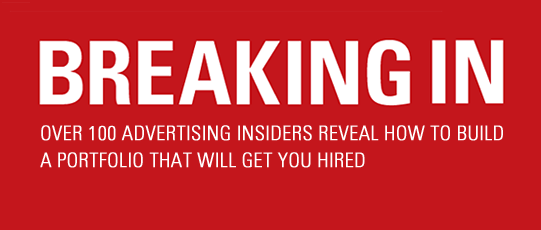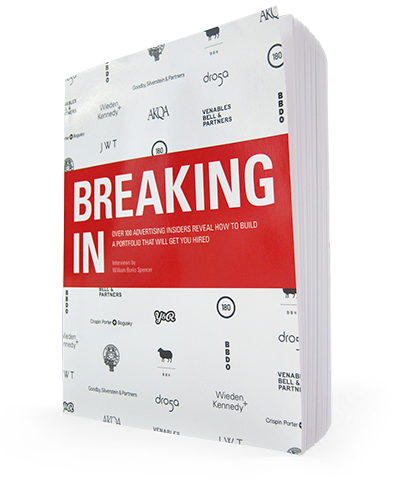Check out some great work from William Gelner.
WS: What do you look for in a student book? And what impresses you?
WG: Fast ideas. You’d be surprised at how many books have slow ideas. Intricate flow charts, multiple steps, a confusing and tiring journey. Yes, I want ideas that are whole and 360-degrees. But tell it simply. That said, the other issue that I see with books is the flip side of that: a lot of books coming out of school that are all visual solutions. That’s really tricky when you’re trying to hire a writer. Maybe it shows that they can think visually and can distill things down, but what about when you need an idea that is simple, well written, and to the point? You’d be surprised at how many writer books don’t have good, concise writing in them. Just verbal diarrhea. That says “lazy” to me. I don’t like lazy.
WS: That was actually one of my follow-up questions: do you think long copy is necessary? And, you sort of answered that, so let me ask it this way: do you think writers need to demonstrate writing in ads, or could it be in something else?
WG: I think it could be something else, as long as it’s not 30 pages. I don’t want to—again, we’re looking for people who can write well. That means simple, concise, insightful. We are in the digital age. And digital takes many forms. It’s not just websites. It’s more about content and conversation. And content needs to be articulated somehow. It can be mobile, for example. Or it can be on-demand content, or it could be television shows, or whatever.
So there’s different varying degrees of writing that is necessary to communicate those kinds of ideas. That said, no one has the time to sit down and go through a book and read multiple pages of stuff. They just don’t. So, my advice to anyone who wants to demonstrate that they’re a good writer would be, “Have a balanced book.” That means some all-visual solutions, some old-school headline ads, that just shows you can write a headline. I mean, we still make print ads; out-of-home and online banners is the same principle. And then people who can write ideas. So, sum up an idea before any campaign that’s in your book. Write that paragraph, three or four sentences, with a heading. That’s enough. If you can write that setup for an idea succinctly, clearly, and well, then demonstrate the idea in various ways, to me you’ve demonstrated that you can write. You don’t have to write three long-copy ads to demonstrate that you can write. In fact, I think long-copy ads are the easiest to write because you have a lot of opportunities to get your point across. I think it’s much harder to write succinctly. It’s that famous quote: “I apologize in advance for writing such a long letter. I didn’t have time to write a short one.”
[ … ]
WS: Do you have any tips for someone who’s trying to get into the business?
WG: When you’re putting together your book, and you’re looking for inspiration, don’t look primarily to the award shows. Find inspiration from doing cool shit. Find it in life. Go out there and do things. There’s a quote from John Hegarty: “Do interesting things and interesting things will happen to you.” I love that quote because, to me, it says that if you’re out there living life, and doing really interesting and cool things, you’re going to bring that back to the work you do. There’s nothing worse than when every single thing in someone’s book feels like it’s an ad that they saw in Archive [magazine]. And the second thing would be: Get to the point in your book…make sure that it’s a quick read, that it’s good, that it’s more of a coffee-table book than a novel. Make it quick, make it fun, make it interesting, make it balanced.


Comments are closed.